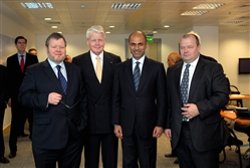2011-04-11
Sendi þessari konu tölvupóst
...og kom eftirfarandi á framfæri við hana.
The Dutch government is responsible for allowing the implementation of the Icesave accounts in the Netherlands in May 2008 only few months before the Icelandic financial system collapsed and only a week after Fitch credit agency warned that the Icelandic financial system would take a hard fall.
It would be beneficial for learning and for future progress as well as just society if the Dutch government would just admit to its taxpayers how it fouled up in its dealings with Landsbanki.

|
„Sjáumst í réttarsalnum“ |
| Tilkynna um óviðeigandi tengingu við frétt | |
Stjórnmál og samfélag | Breytt 12.4.2011 kl. 16:27 | Slóð | Facebook | Athugasemdir (16)
2011-04-11
Grein eftir Michael Hudson (birt í dag)
Why Iceland Voted ‘No”
Michael Hudson
About 75% of Iceland’s voters turned out on Saturday to reject the Social Democratic-Green government’s proposal to pay $5.2 billion to the British and Dutch bank insurance agencies for the Landsbanki-Icesave collapse. Every one of Iceland’s six electoral districts voted in the “No” column – by a national margin of 60% (down from 93% in January 2010).
The vote reflected widespread belief that government negotiators had not been vigorous in pleading Iceland’s legal case. The situation is reminiscent of World War I’s Inter-Ally war debt tangle. Lloyd George described the negotiations between U.S. Treasury Secretary Andrew Mellon and Stanley Baldwin regarding Britain’s arms debt as “a negotiation between a weasel and its quarry. The result was a bargain which has brought international debt collection into disrepute … the Treasury officials were not exactly bluffing, but they put forward their full demand as a start in the conversations, and to their surprise Dr. Baldwin said he thought the terms were fair, and accepted them. … this crude job, jocularly called a ‘settlement,’ was to have a disastrous effect upon the whole further course of negotiations …”
And so it was with Iceland’s negotiation with Britain. True, they got a longer payment period for the Icesave payout. But how is Iceland to obtain the pounds sterling and Euros in the face of its shrinking economy. This is the major payment risk that is still unaddressed. It threatens to plunge the krona’s exchange rate.
The settlement proposal did lower the interest rates from 5.5% to 3.2%, but it included running interest charges on the bailout since 2008. It even included the extra-high interest charges that led depositors to put their funds in Icesave in the first place. Icelanders viewed these interest premiums as compensation for risks – that were taken and should be lost by the high-interest Internet depositors.
So the Icesave problem will now go to the courts. The relevant EU directive states that “that the cost of financing such schemes must be borne, in principle, by credit institutions themselves.” As priority claimants Britain and the Netherlands will indeed get the lion’s share of what is left from the Landsbanki corpse. That was not the issue before Iceland’s voters. They simply aimed at saving Iceland from an open-ended obligation to take the bank’s losses onto the public balance sheet without a clear plan of just how Iceland is to get the money to pay.
Prime Minister Johanna Sigurdardottir <http://topics.nytimes.com/top/reference/timestopics/people/s/johanna_sigurdardottir/index.html?inline=nyt-per> warns that the vote may trigger “political and economic chaos.” But trying to pay also threatens this. The past year has seen the disastrous experience of Greece, Ireland and now Portugal in taking reckless private sector bank debts onto the public balance sheet. It is hard to expect any sovereign nation to impose a decade or more of deep depression on its economy inasmuch as international law permits every nation to act in its own vital interests.
Attempts by creditors to persuade nations to bail out their banks at public expense thus is ultimately an exercise in public relations. Icelanders have seen how successful Argentina has been since it imposed a crew haircut on its creditors. They also have seen the economic and political disruption in Ireland and Greece resulting from trying to pay beyond their means.
Creditors did not give accurate advice when they told Ireland that it could pay for its bank failures without plunging the economy into depression. Ireland’s experience stands as a warning to other countries about trusting overly optimistic forecasts by central bankers. In Iceland’s case, in November 2008 the IMF staff projected yearend-2009 gross external public and private debt at 160% of GDP – but observed that an exchange rate depreciation of 30% would push the ratio to 240% of GDP, which would be “clearly unsustainable.” But the most recent IMF staff report (January 14, 2011) shows end-2009 gross external debt at 308% of GDP, and estimates end-2010 gross external debt at 333% – even before taking the Icesave and other debts into account!
The main problem with Iceland’s obligation to Britain and the Netherlands is that foreign debt is not paid out of GDP. Apart from what is recovered from Landsbanki (now with the help of Britain’s Serious Fraud Office), the money must be paid in exports. But there has been no negotiation with Britain and Holland over just what Icelandic goods and services these countries would be willing to take in payment. Already in the 1920s, John Maynard Keynes pointed out that the Allied creditor nation had to take some responsibility just how Germany could pay its reparations, if not by exporting more to these countries. In practice, German cities borrowed in New York, turned the dollars over to the Reichsbank, which paid Britain and France, which paid the money back to the U.S. Government for their Inter-Ally Arms debts. In other words, Germany tried to “borrow its way out of debt.” It never works over time.
The normal practice would be for Iceland to appoint a Group of Experts to lay out the strongest possible case. No sovereign nation can be expected to acquiesce in imposing a generation of financial austerity, economic shrinkage and forced emigration of labor to pay for the failed neoliberal experiment that has dragged down so many other European economies.

|
Óbreytt einkunn hjá Fitch |
| Tilkynna um óviðeigandi tengingu við frétt | |
Stjórnmál og samfélag | Breytt s.d. kl. 19:20 | Slóð | Facebook | Athugasemdir (3)
það er firringin sem blasir við í samtímanum. Með því að setja fólk úr hrunstjórninni í forystu og stökkva ofan í vasa Alþjóðagjaldeyrissjóðsins festi ríkisstjórnin í sessi hugmyndafræði ný-frjálshyggjunnar og ríkisstjórnin hefur starfað eftir hennar.
Kenningar um að allt lagist ef ríkisstjórninni tekst að ávinna sér traust alþjóðasamfélagsins eða að auknar erlendar lántökur og aukin skuldsetning auki traust alþjóðasamfélagsins eru af þessum meiði.
Þessi ríkisstjórn gefur mannlífinu á Íslandi lítinn gaum. Lítt verður vart við áhyggjur af því að tugir þúsunda flýja land enda virðist eiga leysa vanda ríkissjóðs vegna atvinnuleysis með því að hrekja fólk úr landi.
Það er þó undarlegt að Bjarni Ben telji sig geta boðið upp á betra. Varla hefur sjálfstæðisflokkurinn látið sig mannlífið í landinu miklu varða og einblínd á bólulausnir sem aldrei vara til framtíðar.

|
Aðrir ættu að íhuga sína stöðu |
| Tilkynna um óviðeigandi tengingu við frétt | |
Stjórnmál og samfélag | Breytt s.d. kl. 19:24 | Slóð | Facebook | Athugasemdir (7)
Ráðherrarnir fullyrtu að nægar eignir væru í þrotabúi Landsbankans til þess að ganga upp í kröfur Breta og Hollendinga. En hvað?
Eijffinger telur greinilega ríkisstjórn Íslands lifa í blekkingum. Spurningin er fær Eijiffinger aðrar upplýsingar frá skilanefnd Landsbankans en ríkisstjórn Íslands eða er annar hvor að ljúga.
Fullyrt er á Facebókinni að Hollendingar hafi hirt minnst 453 milljarða af Kaupþing Edge í Hollandi.
"Hollenski bankin ING tók yfir allar innistæður Kaupthing Edge úr kennitölu fyrirtæki sem
sem bretar höfðu stofnað til að hirða allar eignir Kaupthing Edge." segir en vísað er í þessa frétt The Telegraph.
Það eru gríðalega miklar umræður í kjölfar NEI og margir stiga fram með ólík sjónarmið.
Ég velti því fyrir mér hvort að ekki hefði tekið við þögn ef JÁið hefði sigrað.
JÁið hefur verið svolítið í mínum hug leið þagnar og uppgjafar.

|
Hóta að standa í vegi aðildar að ESB |
| Tilkynna um óviðeigandi tengingu við frétt | |
Stjórnmál og samfélag | Breytt s.d. kl. 17:59 | Slóð | Facebook | Athugasemdir (2)



 malacai
malacai
 andres08
andres08
 andrigeir
andrigeir
 volcanogirl
volcanogirl
 arikuld
arikuld
 skarfur
skarfur
 axelthor
axelthor
 ahi
ahi
 hugdettan
hugdettan
 thjodarsalin
thjodarsalin
 gammon
gammon
 formosus
formosus
 baldher
baldher
 baldvinj
baldvinj
 creel
creel
 kaffi
kaffi
 veiran
veiran
 birgitta
birgitta
 launafolk
launafolk
 bjarnihardar
bjarnihardar
 bjarnimax
bjarnimax
 gattin
gattin
 binnag
binnag
 ammadagny
ammadagny
 dagsol
dagsol
 eurovision
eurovision
 diesel
diesel
 draumur
draumur
 egill
egill
 egillrunar
egillrunar
 estheranna
estheranna
 evags
evags
 eyglohardar
eyglohardar
 ea
ea
 finni
finni
 fhg
fhg
 geimveran
geimveran
 gerdurpalma112
gerdurpalma112
 stjornarskrain
stjornarskrain
 gretarmar
gretarmar
 vglilja
vglilja
 bofs
bofs
 hreinn23
hreinn23
 dramb
dramb
 duna54
duna54
 gudrunmagnea
gudrunmagnea
 gudruntora
gudruntora
 zeriaph
zeriaph
 gunnaraxel
gunnaraxel
 tilveran-i-esb
tilveran-i-esb
 skulablogg
skulablogg
 silfri
silfri
 hallibjarna
hallibjarna
 maeglika
maeglika
 haugur
haugur
 haukurn
haukurn
 heidistrand
heidistrand
 skessa
skessa
 heimssyn
heimssyn
 diva73
diva73
 helgatho
helgatho
 hehau
hehau
 helgigunnars
helgigunnars
 hildurhelgas
hildurhelgas
 himmalingur
himmalingur
 gorgeir
gorgeir
 disdis
disdis
 holmdish
holmdish
 don
don
 haddih
haddih
 hordurvald
hordurvald
 idda
idda
 ingibjorgelsa
ingibjorgelsa
 imbalu
imbalu
 jakobk
jakobk
 jennystefania
jennystefania
 visaskvisa
visaskvisa
 johannesthor
johannesthor
 islandsfengur
islandsfengur
 joninaottesen
joninaottesen
 fiski
fiski
 jonl
jonl
 jon-o-vilhjalmsson
jon-o-vilhjalmsson
 jonerr
jonerr
 jonsnae
jonsnae
 prakkarinn
prakkarinn
 nonniblogg
nonniblogg
 jonvalurjensson
jonvalurjensson
 jonthorolafsson
jonthorolafsson
 karlol
karlol
 katrinsnaeholm
katrinsnaeholm
 askja
askja
 photo
photo
 kolbrunh
kolbrunh
 leifur
leifur
 kreppukallinn
kreppukallinn
 kristbjorggisla
kristbjorggisla
 krist
krist
 kristinm
kristinm
 kristjan9
kristjan9
 larahanna
larahanna
 liljaskaft
liljaskaft
 ludvikjuliusson
ludvikjuliusson
 ludvikludviksson
ludvikludviksson
 maggiraggi
maggiraggi
 vistarband
vistarband
 marinogn
marinogn
 manisvans
manisvans
 morgunbladid
morgunbladid
 natan24
natan24
 offari
offari
 olimikka
olimikka
 olii
olii
 oliskula
oliskula
 olafurjonsson
olafurjonsson
 olinathorv
olinathorv
 omarbjarki
omarbjarki
 omarragnarsson
omarragnarsson
 huldumenn
huldumenn
 iceland
iceland
 rafng
rafng
 ragnar73
ragnar73
 rheidur
rheidur
 rannveigh
rannveigh
 raudurvettvangur
raudurvettvangur
 reynir
reynir
 undirborginni
undirborginni
 runarsv
runarsv
 samstada-thjodar
samstada-thjodar
 fullvalda
fullvalda
 sigrunzanz
sigrunzanz
 amman
amman
 duddi9
duddi9
 sigurfang
sigurfang
 siggi-hrellir
siggi-hrellir
 sij
sij
 siggisig
siggisig
 siggith
siggith
 sigurjonth
sigurjonth
 stjornlagathing
stjornlagathing
 scorpio
scorpio
 lehamzdr
lehamzdr
 summi
summi
 spurs
spurs
 savar
savar
 tara
tara
 theodorn
theodorn
 ace
ace
 nordurljos1
nordurljos1
 kreppuvaktin
kreppuvaktin
 valdimarjohannesson
valdimarjohannesson
 varmarsamtokin
varmarsamtokin
 vefritid
vefritid
 vest1
vest1
 eggmann
eggmann
 ippa
ippa
 villidenni
villidenni
 vga
vga
 thorsteinnhelgi
thorsteinnhelgi
 valli57
valli57
 toti1940
toti1940
 thordisb
thordisb
 tbs
tbs
 thorsaari
thorsaari
 iceberg
iceberg
 aevark
aevark





